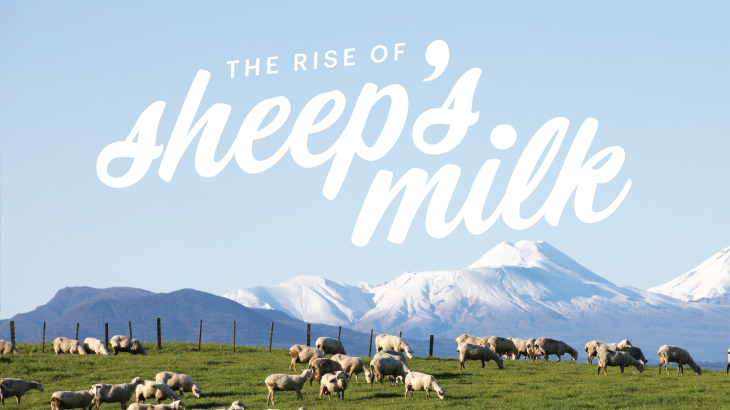The rise of sheep’s milk
Demand for dairy products globally continues to increase at a rate of about two percent a year as more of the world’s population seek a high-quality, nutrient-dense protein source.
Here in New Zealand, land and environmental pressures mean we have achieved “peak cow”, but this doesn’t mean opportunities to continue benefitting from grass-fed dairy demand are gone.
Dairy sheep farming has ramped up quickly from its artisan beginnings, combining Kiwi farmers’ experience with grass-fed dairying and a long association with sheep farming. This has creared an entirely new sector now comprising 20,000 head.
With its highly digestible composition, nutrient-dense profile, and low environmental impact, sheep’s milk is offering some exciting opportunities and alternatives for farmers who may have once only looked at sheep as a source of meat and fibre.
Fernglen Farm, Maui and Spring Sheep Milk New Zealand are leading this exciting new industry prompting more farmers to think about an alternative to cows when it comes to making more milk.
Cameron Ravenwood oversees his family’s Fernglen Farm sheep milking operation that is just completing its third season on their coastal Wairarapa property.
The 600ha-effective farm has proved an ideal platform to build their 1,200-head sheep milking operation from, combining with forestry on the steep country and conventional dry-stock on the rest. The family’s inspiration to start dairy sheep milking came from a simple newspaper cutting Cameron’s dad Jeff took of an article about the (then) strange practice of sheep milking.
As they delved more into the benefits of not only sheep milk, but also its light environmental footprint, his parents put retirement on hold and seized on their later life career change.
Three years in, Fernglen is marketing a range of fresh sheep milk products that includes flavoured milks and fresh plain milk throughout the North Island, including New World supermarkets.
A Lincoln University graduate, Cameron says he is keen to see the family’s flock expand as their market grows, and to see more farmers consider dairy sheep as a valuable land use option.
Sustainability underscores the entire family operation, with over 500ha of native bush across two properties helping make the farm have negative carbon footprint. That care extends to all aspects of their business, including the milking sheep. In March this year, Fernglen became the first ever dairy farm in New Zealand to be awarded an animal welfare certification from the SPCA.
The flock are only milked once a day through the herringbone dairy to minimise walking and energy use, leaving them plenty of time to graze and enjoy a free-range, grass-fed life.
Further north in Waikato, Spring Sheep New Zealand now has 16 suppliers milking 12,700 ewes after commencing production only six years ago.
CEO and founder Nick Hammond says the motivations for farmers wanting to milk sheep are multiple. They include an understanding of dairy sheep’s lower environmental footprint, but also an interest in taking a different approach to dairy farming, and even looking at it as a succession pathway.
He says interest has been stronger than ever in the farming option, and Spring Sheep spends time considering the type of supplier as much as their location when it comes to adding to the group.
“We have had an amazing response from farmers, and they all come on different journeys to get here. For us it is important to have a good supplier dynamic in the Spring Sheep culture, with people keen to share ideas, and the optimism we have for this industry.”
Spring Sheep has bred a robust, Kiwi-type dairy sheep, the “Zealandia”, from high-quality genetics that can produce on average 300 litres per lactation.
Spring Sheep is processing raw milk at the Waikato based Ruakura Innovation Park milk drier. With infant formula its main product focus, the company has enjoyed strong growth in the past two years.
With no reliance upon the Daigou “behalf of” trade to China, the company has been insulated from the big hit taken by many in recent months during travel restrictions.
Other products include nutrition-dense powders that leverage both New Zealand’s grass-fed, free-range reputation and sheep milk’s digestibility and high protein and calcium content.
“We see a good market there for family type powders and for mid-seniors needing products that are dense in calcium, which sheep’s milk is.”
The company’s innovative approach to dairy products earnt it international recognition earlier this year, picking up “best infant formula” product at the World Dairy Innovation Awards, beating heavyweights like Nestle.
On the shores of Lake Taupo lies the Maui Milk dairy sheep genetic improvement operation. Along with the 2,000 sheep being milked here, the company is now collecting supply from 12 other farms in the Waikato and Northern Taupo regions.
CEO Leah Davey says the company has enjoyed a solid period of growth, carefully matching milk supply to the demands of its key customer, global nutrition giant Danone, supplying infant formula powder for its Karicare range.
With the recent and relatively rapid jump in supplier numbers, she says the company is looking to develop a range of new products and concepts for the high-quality powder it processes at Ruakura in Hamilton.
“The high nutritional value of sheep’s milk lends itself well to a range of other nutritional supplements beyond infant formula, and is something we are exploring now,” she says.
She is proud of how far the industry has come in New Zealand over a relatively short time frame, and sees significantly more potential, with strong interest from farmers to supply who have both dry-stock and dairying backgrounds.
“The biggest challenge going forward is to further differentiate ‘brand NZ’ and be able to match the supply and demand, ensuring we can maintain a good price level for what is a premium, high-quality nutritional product,” she says.
Read more...
[Download PDF]Subscribe to receive the latest rural news and insights from Bayleys’ Country magazine.
